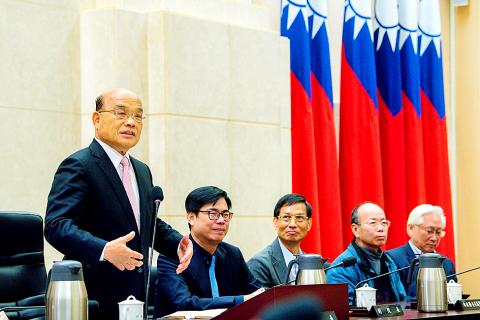Premier Su Tseng-chang (蘇貞昌) led his Cabinet in resigning en masse yesterday evening, weeks earlier than required by the Constitution, following Saturday’s elections that saw President Tsai Ing-wen (蔡英文) win re-election and the Democratic Progressive Party (DPP) retain its legislative majority.
However, Su will continue to serve as premier after the president earlier in the day asked him to remain in his post, Presidential Office spokesman Xavier Chang (張惇涵) said.
Tsai met with Su in the Presidential Office at noon, and asked him to continue to serve as head of the Executive Yuan to maintain stability, and Su agreed, Chang said.

Photo: CNA / Executive Yuan
Tsai had told a news conference on Saturday night that she expected to keep her executive team for her second term to maintain a level of stability amid rapidly changing domestic and international situations.
The 72-year-old Su became premier on Jan. 14 last year. He served as premier from Jan. 25, 2006, to May 20, 2007, and as DPP chairman from 2012 to 2014.
By law, the Cabinet has to resign before the start of the next Legislative Yuan, which will be on Feb. 1.
Lawmakers elected on Saturday will have several personnel nominations to review once they take their seats and during the course of their four-year terms.
The Act Governing the Exercise of Legislative Power (立法院職權行使法) stipulates that legislators should exercise their power of giving consent to the auditor general, prosecutor-general, grand justices, and the president, vice president and other members of the Control Yuan and Examination Yuan, adding that the appointees should be voted on during plenary sessions of the Legislative Yuan without deliberations.
The nominations would be confirmed if they win more than half of the legislative votes, the act says.
Tsai has the opportunity to make a substantive impact on the membership of those posts.
The term of the current Control Yuan members is to expire on July 31, so lawmakers must review the qualifications of Tsai’s nominees and give consent to them by that time.
Current Examination Yuan members are to step down when their terms ends on Aug. 31. The number of nominees to replace them will be reduced to seven or nine, a reduction stipulated by an amendment to the Organic Act of the Examination Yuan (考試院組織法) last year.
The terms of four of the Council of Grand Justices — Huang Horng-shya (黃虹霞), Wu Chen-huan (吳陳鐶), Tsai Ming-cheng (蔡明誠) and Lin Jiun-yi (林俊益) — are to expire on Sept. 30, 2023.
Once they are replaced, all 15 justices would have been nominated by Tsai Ing-wen. She will also be able to nominate a new prosecutor-general, whose term ends in May 2022.
Lawmakers are also to confirm the premier’s nominees for members of the National Communications Commission, Central Election Commission and Fair Trade Commission.
As the terms of these commissioners would overlap to ensure the continuity of governance, lawmakers would confirm the nominees twice during their four-year terms.

Intelligence agents have recorded 510,000 instances of “controversial information” being spread online by the Chinese Communist Party (CCP) so far this year, the National Security Bureau (NSB) said in a report yesterday, as it warned of artificial intelligence (AI) being employed to generate destabilizing misinformation. The bureau submitted a written report to the Legislative Yuan in preparation for National Security Bureau Director-General Tsai Ming-yen’s (蔡明彥) appearance before the Foreign Affairs and National Defense Committee today. The CCP has been using cognitive warfare to divide Taiwanese society by commenting on controversial issues such as Taiwan Semiconductor Manufacturing Co’s (TSMC, 台積電) investments in the

HELPING HAND: The steering committee of the National Stabilization Fund is expected to hold a meeting to discuss how and when to utilize the fund to help buffer the sell-off The TAIEX plunged 2,065.87 points, or 9.7 percent, to close at 19,232.35 yesterday, the highest single-day percentage loss on record, as investors braced for US President Donald Trump’s tariffs after an extended holiday weekend. Amid the pessimistic atmosphere, 945 listed companies led by large-cap stocks — including Taiwan Semiconductor Manufacturing Co (TSMC, 台積電), Hon Hai Precision Industry Co (鴻海精密) and Largan Precision Co (大立光) — fell by the daily maximum of 10 percent at the close, Taiwan Stock Exchange data showed. The number of listed companies ending limit-down set a new record, the exchange said. The TAIEX plunged by daily maxiumu in just

‘COMPREHENSIVE PLAN’: Lin Chia-lung said that the government was ready to talk about a variety of issues, including investment in and purchases from the US The National Stabilization Fund (NSF) yesterday announced that it would step in to staunch stock market losses for the ninth time in the nation’s history. An NSF board meeting, originally scheduled for Monday next week, was moved to yesterday after stocks plummeted in the wake of US President Donald Trump’s announcement of 32 percent tariffs on Taiwan on Wednesday last week. Board members voted to support the stock market with the NT$500 billion (US$15.15 billion) fund, with injections of funds to begin as soon as today. The NSF in 2000 injected NT$120 billion to stabilize stocks, the most ever. The lowest amount it

INVESTIGATION: The case is the latest instance of a DPP figure being implicated in an espionage network accused of allegedly leaking information to Chinese intelligence Democratic Progressive Party (DPP) member Ho Jen-chieh (何仁傑) was detained and held incommunicado yesterday on suspicion of spying for China during his tenure as assistant to then-minister of foreign affairs Joseph Wu (吳釗燮). The Taipei District Prosecutors’ Office said Ho was implicated during its investigation into alleged spying activities by former Presidential Office consultant Wu Shang-yu (吳尚雨). Prosecutors said there is reason to believe Ho breached the National Security Act (國家安全法) by leaking classified Ministry of Foreign Affairs information to Chinese intelligence. Following interrogation, prosecutors petitioned the Taipei District Court to detain Ho, citing concerns over potential collusion or tampering of evidence. The